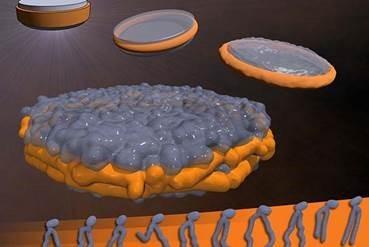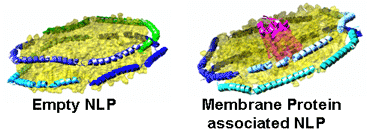Membrane-associated proteins and protein complexes account for roughly one-third of the cellular proteins. These protein complexes mediate essential cellular processes such as signal transduction, transport, recognition, and cell-to-cell communication. This class of proteins is difficult to study because of their insolubility and tendency to aggregate when removed from their protein-phospholipid lipid bilayer environment. Also, over-expression of membrane proteins in vivo often results in cell toxicity, protein aggregation, mis-folding and low yield.
LLNL has developed a novel process of production, isolation, characterization, and functional re-constitution of membrane-associated proteins in a single step. In addition, LLNL has developed a colorimetric assay that indicates production, correct folding, and incorporation of bR into soluble nanolipoprotein particles (NLPs).
LLNL has developed an approach, for formation of NLP/membrane protein complexes by simultaneous co-expression of both apolipoprotein and target membrane protein in a cell-free protein synthesis system. This approach involves cell-free transcription/translation technology adapted to co-express both apolipoproteins and a target membrane protein. It is carried out in a single reaction chamber with cell extract, buffer, phospholipds, detergents and the like to facilitate stabilization; the entire process can be complete in a few hours.
- Cell-free protein synthesis technology allows simultaneous expression of apolipoproteins and membrane proteins leading to self-assembly of nanolipoprotein particles containing soluble and functional proteins within a stable membrane mimetic.
- Cell-free method of simultaneous co-expression of both apolipoprotein and target membrane can be achieved in a single step.
- Process can be completed in a few hours.
- Increase yields of stable, soluble and functional membrane proteins for downstream characterization.
- Membrane proteins are expressed rather than purified from cellular sources.
- Rapid production of novel functional membrane proteins that are difficult to obtain from native systems
- Process screening of parameters for evaluation of production of membrane proteins
- Medical diagnostics, therapeutics, biofuels
US Patent No. 11300572 Methods and systems for producing nanolipoprotein particles published 04/12/2022
US Patent Application 20220283171 METHODS AND SYSTEMS FOR PRODUCING NANOLIPOPROTEIN PARTICLES published 9/8/2022



